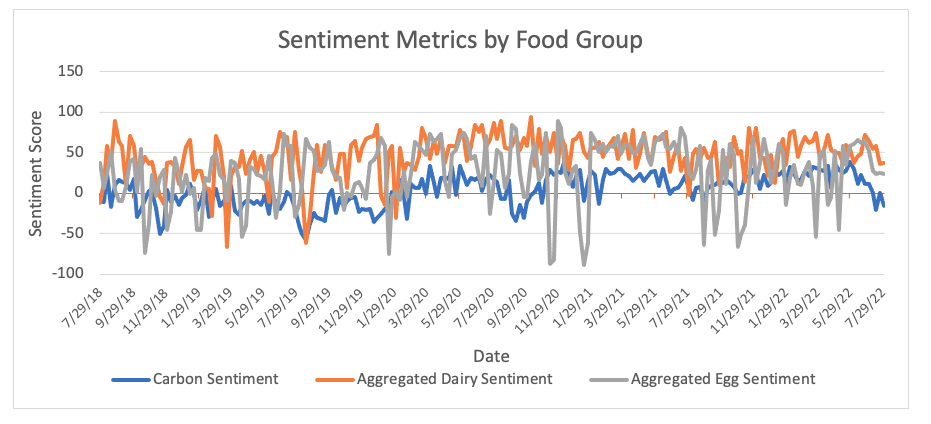The emergence of social media has created an environment of flash publicity. Products and companies can become glorified or vilified faster than we can remember to check our email. Producers, even those buried deep in the value chain, can now become overnight internet sensations. Even if online sentiment has not yet crossed your mind, perhaps it should now!
I am working with a research team in Purdue University’s Department of Agricultural Economics Department to examine consumer sentiment of livestock products and their carbon emissions, examining data from the web spanning 2018-2021. With this type of research, we can pull useful insights into how consumer perception is evolving in front of our eyes! While we won’t belabor results here (publications are forthcoming), we can share that we have reaffirmed some notions already discussed on Consumer Corner. The last century of intensification of agriculture and productivity growth has improved farmers’ environmental performance, and farmers have more recently continued to progress through carbon markets, although time will tell if these are implemented correctly.
While some activists push for far more progress, we caution the consumer does not always know what they want. Recall in 2019 as a wave of scorn for single-use plastic swept the nation, retailers including Starbucks moved quickly to accommodate reusable cups and eliminate straws. As fast as the reusable cups integrated, they were removed for public health concerns as the pandemic began. In fact, the way consumers behaved under duress reminds us we must remain agile in our marketing, messaging and product placement! Just as consumers began to forget their demands for reusable cups in retail stores, they also began to abandon discussion of negative environmental consequences on social medias. Shown below, we can see during the COVID-19 lockdown period (03/2020-06/2021) the sentiment scores push mostly positive.

But what goes around comes around. As producers, we ought to recall that markets can change on a dime, and consumer sentiment can too. Just as concerns about the health of the meat supply chain arose and subsided quickly, we see public interest migrating to a more positive discussion of the environment, focused on solutions (as opposed to world-ending tragedies). We find consumers are now interested in what companies are doing to practice sustainability, and they love family farms! If you can speak to these issues, we encourage you to let your consumers know! Agribusinesses would be wise to heed this call, but wiser still to avoid the mistake of being all hat and no cattle.
ConsumerCorner.2023.Letter.14




